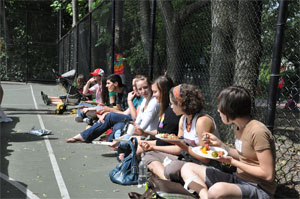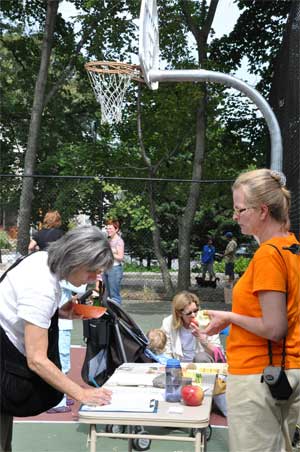
|
| Attendees lined the tennis court and tried to get a shady spot to enjoy their meals. |
 |
 |
| Rep. Denise Provost talks to organizer Karen Bauerle. ~Photos by Meghan Frederico |
|
By Meghan Frederico
On
Monday afternoon of the long Labor Day weekend, residents of Somerville
and beyond gathered in Lexington Park near Davis Square for an
afternoon of "slow food".
The potluck goers were instructed to
bring nutritious, inexpensive dishes, and the fresh spread also
included donations from local eateries such as Red Bones and When Pigs
Fly. Nicewicz farms, which sets up shop a weekly the Union Square
farmers market, provided baskets of seasonal fruit, and attendees were
left reaching for napkins after indulging in the ripe nectarines.
The
Somerville potluck was one of hundreds of "eat-ins" across the country
organized by different chapters of the group SlowFoodUSA. Some chapters
are affiliated with universities, while others were started by
entrepreneurial-minded citizens like resident Karen Bauerle, who
created the Somerville Slow Food blog a mere two weeks ago.
"Initially
I thought slow food was an elite movement," she said, but then she
learned that the slow food agenda actually supports making healthful,
affordable food accessible to all, and especially to children.
Membership dues also allow full access to the central website, which
makes food-related political activism easier for members, utilizing
model similar MoveOn.org.
The concerted nationwide effort was
aimed at drawing attention to the Child Nutrition Act, which is up for
reauthorization in Congress this fall. Federal funding for K-12 lunches
is currently $2.57 per meal, and Slow Food m embers are collecting
signatures on their petition to raise the amount by $1. Such an amount,
members hope, would allow schools to serve more nutritious meals from
locally grown sources. Because of the implications of childhood eating
habit, the issue also ties into healthcare and the nation's public
health agenda.
"30% of children in Massachusetts are obese," Ms.
Bauerle pointed out. A report released in July by the Trust for
America's Health (TFAH) revealed this alarming statistic, along with
the finding that rates are significantly higher for non-white
populations. "This is putting children at risk for diabetes and
amputations by the age of 25 and the healthcare costs associated with
this will be overwhelming"; said Ms. Bauerle, an attorney who currently
interns for the Boston-based Public Health Advocacy Institute.
Somerville's efforts to stem childhood obesity, and the Shape up
Somerville efforts, came on the heels of another alarming statistic
that 46% of Somerville's 1st-3rd grade population were at-risk of being
overweight or were overweight, which was one finding from a 2003 Tufts
report.
But although Somerville may be ahead of the curve in
terms of programming, there is still room for improvement. "Shape up
Somerville has been a great program," said the event's co-organizer
Kelly Shugrue, "but we still have a long way to go." For the most part,
children are still being fed reheated, canned, processed foods at
school, she said, expressing hope that additional Congressional funding
could outfit school cafeterias with enough staff and equipment to begin
cooking in earnest, ideally with real, organic, and locally grown food.
|
Reader Comments